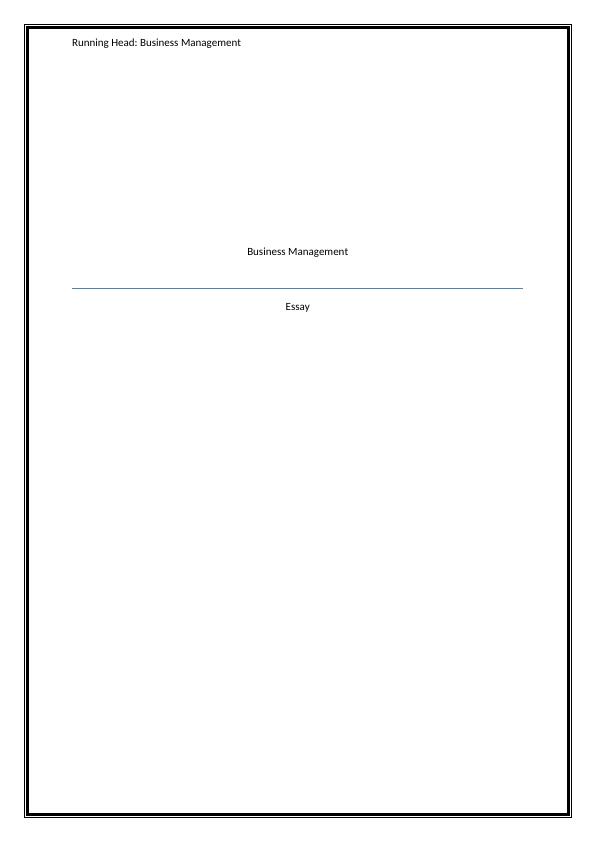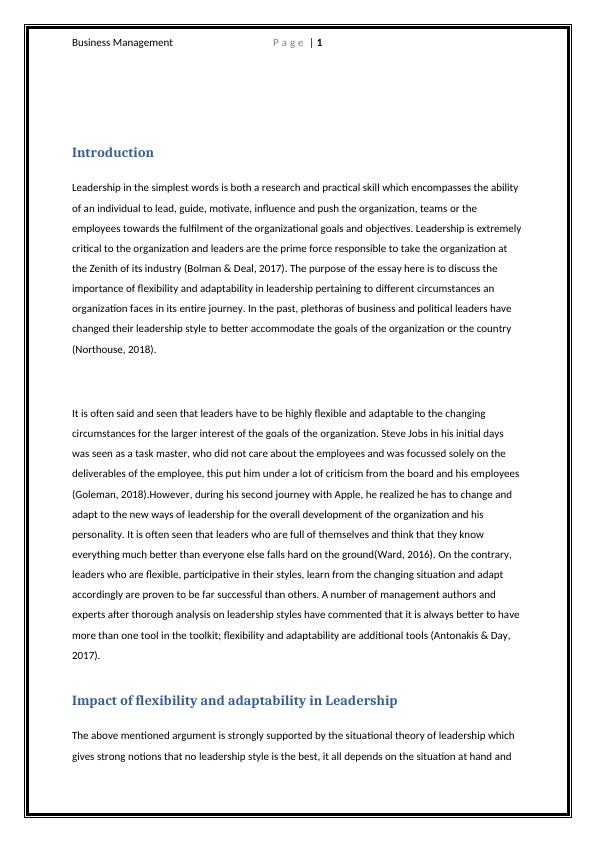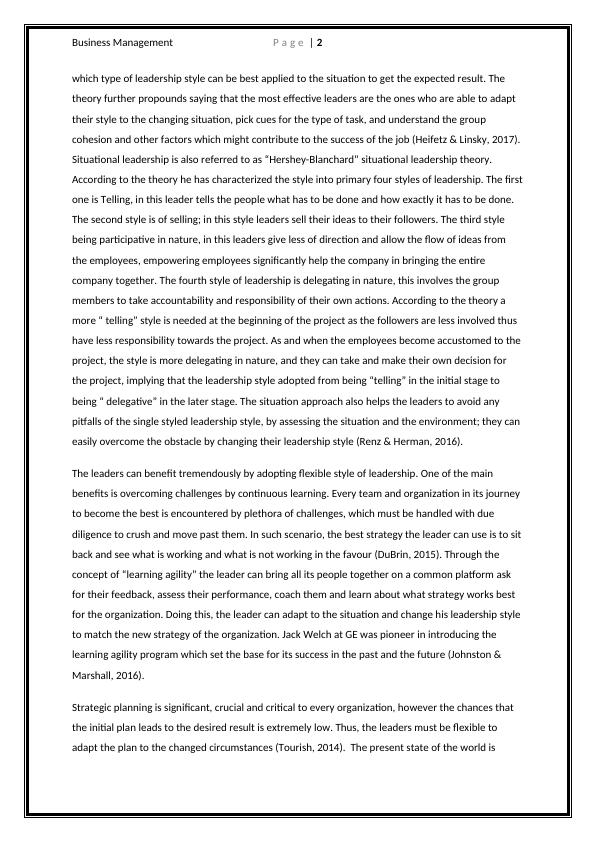Importance of Flexibility and Adaptability in Leadership
Added on 2023-06-13
9 Pages2766 Words420 Views
Running Head: Business Management
Business Management
Essay
Business Management
Essay

Business Management P a g e | 1
Introduction
Leadership in the simplest words is both a research and practical skill which encompasses the ability
of an individual to lead, guide, motivate, influence and push the organization, teams or the
employees towards the fulfilment of the organizational goals and objectives. Leadership is extremely
critical to the organization and leaders are the prime force responsible to take the organization at
the Zenith of its industry (Bolman & Deal, 2017). The purpose of the essay here is to discuss the
importance of flexibility and adaptability in leadership pertaining to different circumstances an
organization faces in its entire journey. In the past, plethoras of business and political leaders have
changed their leadership style to better accommodate the goals of the organization or the country
(Northouse, 2018).
It is often said and seen that leaders have to be highly flexible and adaptable to the changing
circumstances for the larger interest of the goals of the organization. Steve Jobs in his initial days
was seen as a task master, who did not care about the employees and was focussed solely on the
deliverables of the employee, this put him under a lot of criticism from the board and his employees
(Goleman, 2018).However, during his second journey with Apple, he realized he has to change and
adapt to the new ways of leadership for the overall development of the organization and his
personality. It is often seen that leaders who are full of themselves and think that they know
everything much better than everyone else falls hard on the ground(Ward, 2016). On the contrary,
leaders who are flexible, participative in their styles, learn from the changing situation and adapt
accordingly are proven to be far successful than others. A number of management authors and
experts after thorough analysis on leadership styles have commented that it is always better to have
more than one tool in the toolkit; flexibility and adaptability are additional tools (Antonakis & Day,
2017).
Impact of flexibility and adaptability in Leadership
The above mentioned argument is strongly supported by the situational theory of leadership which
gives strong notions that no leadership style is the best, it all depends on the situation at hand and
Introduction
Leadership in the simplest words is both a research and practical skill which encompasses the ability
of an individual to lead, guide, motivate, influence and push the organization, teams or the
employees towards the fulfilment of the organizational goals and objectives. Leadership is extremely
critical to the organization and leaders are the prime force responsible to take the organization at
the Zenith of its industry (Bolman & Deal, 2017). The purpose of the essay here is to discuss the
importance of flexibility and adaptability in leadership pertaining to different circumstances an
organization faces in its entire journey. In the past, plethoras of business and political leaders have
changed their leadership style to better accommodate the goals of the organization or the country
(Northouse, 2018).
It is often said and seen that leaders have to be highly flexible and adaptable to the changing
circumstances for the larger interest of the goals of the organization. Steve Jobs in his initial days
was seen as a task master, who did not care about the employees and was focussed solely on the
deliverables of the employee, this put him under a lot of criticism from the board and his employees
(Goleman, 2018).However, during his second journey with Apple, he realized he has to change and
adapt to the new ways of leadership for the overall development of the organization and his
personality. It is often seen that leaders who are full of themselves and think that they know
everything much better than everyone else falls hard on the ground(Ward, 2016). On the contrary,
leaders who are flexible, participative in their styles, learn from the changing situation and adapt
accordingly are proven to be far successful than others. A number of management authors and
experts after thorough analysis on leadership styles have commented that it is always better to have
more than one tool in the toolkit; flexibility and adaptability are additional tools (Antonakis & Day,
2017).
Impact of flexibility and adaptability in Leadership
The above mentioned argument is strongly supported by the situational theory of leadership which
gives strong notions that no leadership style is the best, it all depends on the situation at hand and

Business Management P a g e | 2
which type of leadership style can be best applied to the situation to get the expected result. The
theory further propounds saying that the most effective leaders are the ones who are able to adapt
their style to the changing situation, pick cues for the type of task, and understand the group
cohesion and other factors which might contribute to the success of the job (Heifetz & Linsky, 2017).
Situational leadership is also referred to as “Hershey-Blanchard” situational leadership theory.
According to the theory he has characterized the style into primary four styles of leadership. The first
one is Telling, in this leader tells the people what has to be done and how exactly it has to be done.
The second style is of selling; in this style leaders sell their ideas to their followers. The third style
being participative in nature, in this leaders give less of direction and allow the flow of ideas from
the employees, empowering employees significantly help the company in bringing the entire
company together. The fourth style of leadership is delegating in nature, this involves the group
members to take accountability and responsibility of their own actions. According to the theory a
more “ telling” style is needed at the beginning of the project as the followers are less involved thus
have less responsibility towards the project. As and when the employees become accustomed to the
project, the style is more delegating in nature, and they can take and make their own decision for
the project, implying that the leadership style adopted from being “telling” in the initial stage to
being “ delegative” in the later stage. The situation approach also helps the leaders to avoid any
pitfalls of the single styled leadership style, by assessing the situation and the environment; they can
easily overcome the obstacle by changing their leadership style (Renz & Herman, 2016).
The leaders can benefit tremendously by adopting flexible style of leadership. One of the main
benefits is overcoming challenges by continuous learning. Every team and organization in its journey
to become the best is encountered by plethora of challenges, which must be handled with due
diligence to crush and move past them. In such scenario, the best strategy the leader can use is to sit
back and see what is working and what is not working in the favour (DuBrin, 2015). Through the
concept of “learning agility” the leader can bring all its people together on a common platform ask
for their feedback, assess their performance, coach them and learn about what strategy works best
for the organization. Doing this, the leader can adapt to the situation and change his leadership style
to match the new strategy of the organization. Jack Welch at GE was pioneer in introducing the
learning agility program which set the base for its success in the past and the future (Johnston &
Marshall, 2016).
Strategic planning is significant, crucial and critical to every organization, however the chances that
the initial plan leads to the desired result is extremely low. Thus, the leaders must be flexible to
adapt the plan to the changed circumstances (Tourish, 2014). The present state of the world is
which type of leadership style can be best applied to the situation to get the expected result. The
theory further propounds saying that the most effective leaders are the ones who are able to adapt
their style to the changing situation, pick cues for the type of task, and understand the group
cohesion and other factors which might contribute to the success of the job (Heifetz & Linsky, 2017).
Situational leadership is also referred to as “Hershey-Blanchard” situational leadership theory.
According to the theory he has characterized the style into primary four styles of leadership. The first
one is Telling, in this leader tells the people what has to be done and how exactly it has to be done.
The second style is of selling; in this style leaders sell their ideas to their followers. The third style
being participative in nature, in this leaders give less of direction and allow the flow of ideas from
the employees, empowering employees significantly help the company in bringing the entire
company together. The fourth style of leadership is delegating in nature, this involves the group
members to take accountability and responsibility of their own actions. According to the theory a
more “ telling” style is needed at the beginning of the project as the followers are less involved thus
have less responsibility towards the project. As and when the employees become accustomed to the
project, the style is more delegating in nature, and they can take and make their own decision for
the project, implying that the leadership style adopted from being “telling” in the initial stage to
being “ delegative” in the later stage. The situation approach also helps the leaders to avoid any
pitfalls of the single styled leadership style, by assessing the situation and the environment; they can
easily overcome the obstacle by changing their leadership style (Renz & Herman, 2016).
The leaders can benefit tremendously by adopting flexible style of leadership. One of the main
benefits is overcoming challenges by continuous learning. Every team and organization in its journey
to become the best is encountered by plethora of challenges, which must be handled with due
diligence to crush and move past them. In such scenario, the best strategy the leader can use is to sit
back and see what is working and what is not working in the favour (DuBrin, 2015). Through the
concept of “learning agility” the leader can bring all its people together on a common platform ask
for their feedback, assess their performance, coach them and learn about what strategy works best
for the organization. Doing this, the leader can adapt to the situation and change his leadership style
to match the new strategy of the organization. Jack Welch at GE was pioneer in introducing the
learning agility program which set the base for its success in the past and the future (Johnston &
Marshall, 2016).
Strategic planning is significant, crucial and critical to every organization, however the chances that
the initial plan leads to the desired result is extremely low. Thus, the leaders must be flexible to
adapt the plan to the changed circumstances (Tourish, 2014). The present state of the world is

End of preview
Want to access all the pages? Upload your documents or become a member.
Related Documents
Contemporary Management Issues in 21st Century: Shackleton's Leadership Style and Critical Analysis of Marks & Spenserlg...
|7
|1978
|440
6BUS1141 Leadership and Organisationslg...
|8
|2127
|137
Leadership & Management: Assignmentlg...
|7
|1548
|31
Leadership Theorieslg...
|6
|1564
|470
Contingency Approach Leadershiplg...
|7
|1041
|50
Personal Leadership Theory - Assignmentlg...
|5
|1002
|25
